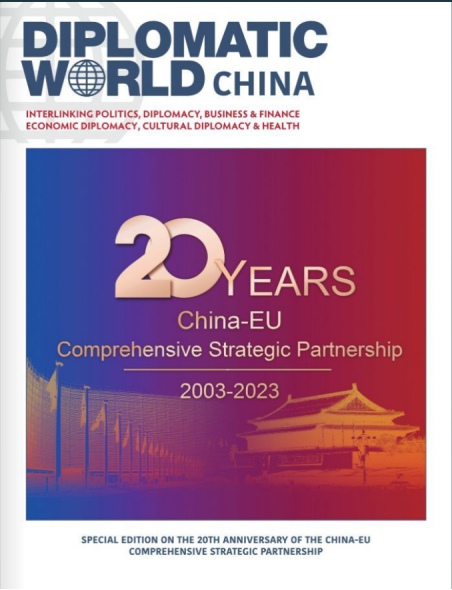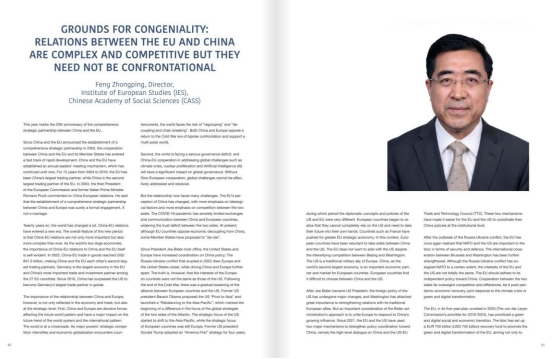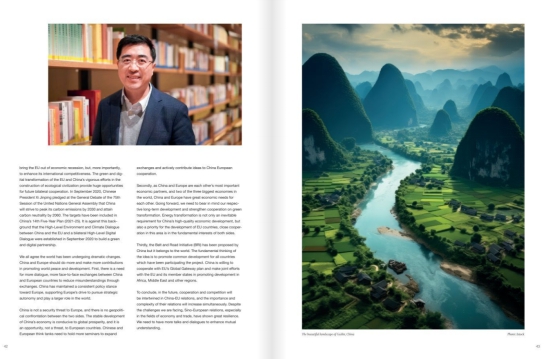冯仲平所长在布鲁塞尔《外交世界》撰文讨论中欧关系
2023年是中国与欧盟建立全面战略伙伴关系20周年。布鲁塞尔《外交世界》(DIPLOMATIC WORLD)与中国驻欧盟使团策划和出版中欧建立全面战略伙伴关系20周年专刊。冯仲平所长应《外交世界》杂志邀请,撰文全面分析中欧全面战略伙伴关系的现状及发展前景。
原文链接 :
https://www.yumpu.com/en/document/read/68543461/diplomatic-world-magazine-china(pages 40-43)

Grounds for congeniality
Relations between the EU and China are complex and competitive but they need not be confrontational
By Feng Zhongping, Director, Institute of European Studies of Chinese Academy of Social Sciences (IES, CASS)
This year marks the 20th anniversary of the comprehensive strategic partnership between China and the EU.
Since China and the EU announced the establishment of a comprehensive strategic partnership in 2003, the cooperation between China and the EU and its member states has entered a fast track of rapid development. China and the EU have established an annual leaders' meeting mechanism, which has continued until now. For 15 years from 2004 to 2019, the EU has been China's largest trading partner, while China is the second largest trading partner of the EU. In 2003, the then President of the European Commission and former Italian Prime Minister Romano Prodi commented on China European relations. He said that the establishment of a comprehensive strategic partnership between China and Europe was surely a formal engagement, if not a marriage.
Twenty years on, the world has changed a lot. China European relations have entered a new era. The overall feature of this new period is that China-EU relations are not only more important but also more complex than ever. As the world's two large economies, the importance of China-EU relations to China and the EU itself is self-evident. In 2022, China-EU trade in goods reached US $847.3 billion, making China and the EU each other's second largest trading partner. Germany is the largest economy in the EU and China’s most important trade and investment partner among the 27 EU countries. Since 2016, China has surpassed the US to become Germany's largest trade partner in goods.
The importance of the relationship between China and Europe, however, is not only reflected in the economy and trade, but also at the strategic level. First, China and Europe are decisive forces affecting the future world pattern and have a major impact on the future trend of the world system and the international pattern. The world is at a crossroads. As major powers' strategic competition intensifies and economic globalization encounters countercurrents, the world faces the risk of "regrouping" and "decoupling and chain breaking". Both China and Europe oppose a return to the Cold War era of bipolar confrontation and support a multi-polar world.
Second, the world is facing a serious governance deficit, and China-EU cooperation in addressing global challenges such as climate crisis, nuclear proliferation and artificial intelligence will have a significant impact on global governance. Without China European cooperation, global challenges cannot be effectively addressed and resolved.
But the relationship now faces many challenges. The EU's perception of China has changed, with more emphasis on ideological factors and more emphasis on competition between the two sides. The COVID-19 pandemic has severely limited exchanges and communication between China and European countries, widening the trust deficit between the two sides. At present, although EU countries oppose economic decoupling from China, some member states have proposed to "de-risk".
Since Biden took office, the United States and Europe have increased coordination on China policy; The Russia-Ukraine conflict that erupted in 2022 drew Europe and the United States closer, while driving China and Europe further apart. The truth is, however, that the interests of the European countries were not the same as those of the US. Following the end of the Cold War, there was a gradual loosening of the alliance between European countries and the US. Former US president Barack Obama proposed the US “Pivot to Asia” and launched a “Rebalancing to the Asia-Pacific”, which marked the beginning of a difference in the focus of the global strategies of the two sides of the Atlantic. The strategic focus of the US started to shift to the Asia-Pacific, while the strategic focus of European countries was still Europe. Former US president Donald Trump adopted an “America First” strategy for four years, during which period the diplomatic concepts and policies of the US and EU were very different. European countries began to realize that they cannot completely rely on the US and need to take their future into their own hands. Countries such as France have pushed for greater EU strategic autonomy. In this context, European countries have been reluctant to take sides between China and the US. The EU does not want to side with the US despite the intensifying competition between Beijing and Washington. The US is a traditional military ally of Europe. China, as the world's second largest economy, is an important economic partner and market for European countries. European countries find it difficult to choose between China and the US.
After Joe Biden became US president, the foreign policy of the US has undergone major changes, and Washington has attached great importance to strengthening relations with its traditional European allies. But an important consideration of the Biden administration’s approach is to unite Europe to respond to China’s growing influence. Since 2021, the EU and the US have used two major mechanisms to strengthen policy coordination toward China, namely the high-level dialogue on China and the US-EU Trade and Technology Council (TTC). These two mechanisms have made it easier for the EU and the US to coordinate their China policies at the institutional level.
After the outbreak of the Russia-Ukraine conflict, the EU has once again realized that NATO and the US are important to the bloc in terms of security and defense. The international cooperation between Brussels and Washington has been further strengthened. Although the Russia-Ukraine conflict has energized NATO to a certain extent, the interests of the EU and the US are not totally the same. The EU should adhere to its independent policy toward China. Cooperation between the two sides far outweighs competition and differences, be it post-pandemic economic recovery, joint response to the climate crisis or green and digital transformation.
The EU, in its five-year-plan unveiled in 2020, has prioritized a green and digital social and economic transition. The bloc has set up a 750 billion euro ($755 billion) recovery fund to promote the green and digital transformation of the EU, aiming not only to bring the EU out of economic recession, but, more importantly, to enhance its international competitiveness. The green and digital transformation of the EU and China’s vigorous efforts in the construction of ecological civilization provide huge opportunities for future bilateral cooperation. In September 2020, Chinese President Xi Jinping pledged at the General Debate of the 75th Session of the United Nations General Assembly that China will strive to peak its carbon emissions by 2030 and attain carbon neutrality by 2060. The targets have been included in China’s 14th Five-Year Plan (2021-25). It is against this background that the High-Level Environment and Climate Dialogue between China and the EU and a bilateral High-Level Digital Dialogue were established in September 2020 to build a green and digital partnership.
We all agree the world has been undergoing dramatic changes. China and Europe should do more and make more contributions in promoting world peace and development. First, there is a need for more dialogue, more face-to-face exchanges between China and European countries to reduce misunderstandings and doubts through exchanges. China has maintained a consistent policy stance toward Europe, supporting Europe’s drive to pursue strategic autonomy and play a larger role in the world. China is not a security threat to Europe, and there is no geopolitical confrontation between the two sides. The stable development of China’s economy is conducive to global prosperity, and it is an opportunity, not a threat, to European countries. Chinese and European think tanks need hold more seminars to expand exchanges and actively contribute ideas to China European cooperation.
Secondly, As China and Europe are each other’s most important economic partners, and two of the three biggest economies in the world, China and Europe have great economic needs for each other. Going forward, we need to bear in mind our respective long-term development and strengthen cooperation on green transformation. Energy transformation is not only an inevitable requirement for China's high-quality economic development, but also a priority for the development of EU countries, close cooperation in this area is in the fundamental interests of both sides.
Thirdly, Belt and Road initiative has been proposed by China but it belongs to the world. The fundamental thinking of the idea is to promote common development for all countries which have been participating the project. China is willing to cooperate with EU’s Global Gateway plan and make joint efforts with the EU and its member states in promoting development in Africa, Middle East and other regions.
To conclude, in the future, cooperation and competition will be intertwined in China European relations, and the importance and complexity of China European relations will increase simultaneously. Despite challenges we are facing, China European relations, esp. the economic and trade relations have shown great resilience. We need have more talks and dialogues to enhance our understandings.


作者简介:冯仲平,中国社会科学院欧洲研究所所长、研究员。
文章来源:DIPLOMATIC WORLD
